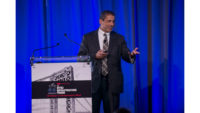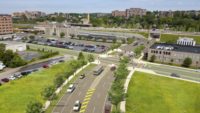Legal
NY Court Halts Work on $2.3B Syracuse I-81 Viaduct Removal

A New York state supreme court judge has granted project opponents’ request for a temporary restraining order to halt a $2.3-billion effort to replace the aging Interstate-81 viaduct in Syracuse, N.Y., with a street grid format.
The injunction, issued on Nov. 10 by Judge Gerard H. Neri, prohibits the state transportation department from advancing project design or construction pending resolution of opponents' lawsuit, with oral arguments set for Jan. 12.
Advocacy group Renew 81 for All, which opposes the I-81 project in its current "community grid" form, and several other groups, sought the injunction in a September lawsuit.
Removal of the I-81 viaduct passed a key milestone in September with firms shortlisted for the first phase of design-build work submitting proposals, Nicolas Choubah, state DOT chief engineer said Sept. 16 at an ENR Infrastructure event in New York City. He said that with contract award, construction was expected to start in late 2022 and continue through 2025. A second contact was also set to be issued by December.
The injunction is “another unnecessary delay,” Syracuse Mayor Ben Welsh said in a statement. The project "should continue to move ahead, and I look forward to the state’s response to the judge’s ruling.” Welsh points to the project’s community outreach related to environmental impacts and local job development and training.
State DOT spokesman Joseph Morrissey declined comment to ENR on whether the state is appealing the injunction and on how the injunction would affect project schedule.
Earlier, Morrissey told Syracuse.com that Gov. Kathy Hochul’s administration “is committed to projects across the state that undo the damage of past planning decisions that have left communities of color segregated, marginalized and vulnerable to environmental and health challenges."
The I-81 plan received federal environmental approval and state funding in May.
The plan calls for demolishing the I-81 viaduct through downtown Syracuse and replacing it with a new "business loop 81." The state also planned to reconnect neighborhoods through a network of streets and rebuild portions of Interstates 481 and 490 to allow high-speed traffic.
In its lawsuit, the advocacy group claims the project does not comply with state environmental rules and was supported by a flawed review that did not consider alternatives with fewer negative environmental, business, social and traffic impacts.
Welsh defended the project’s rigorous multi-year state and federal reviews.
In a defense against the injunction, state Assistant Attorney General Meredith Lee-Clark raised concerns about costs of delay to the state if contacts can't be finalized.



